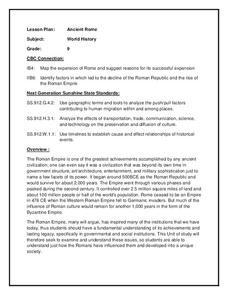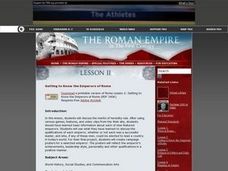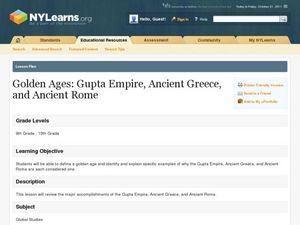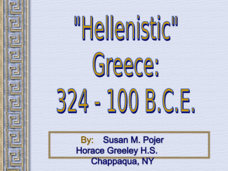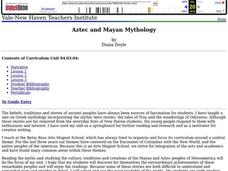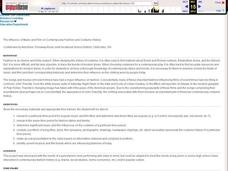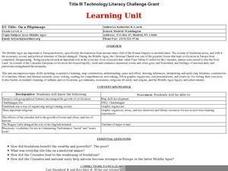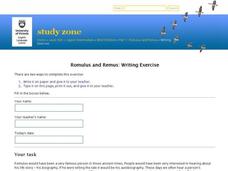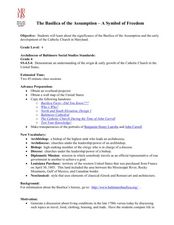Curated OER
What the Romans Did for Us.
What things can we attribute to the ancient Romans? Check out each of these images to find out. There are 26 slides, each containing a single image of Roman legacy that can still be seen today. Architecture, art, libraries, cats, and...
Curated OER
Ancient Rome (Review)
Ninth graders investigate how Rome evolved from a republic to an empire. In this ancient Rome lesson, 9th graders listen to a SMART Board lecture about the Roman Republic and the Roman Empire. Students then play 4 games that require them...
Curated OER
Impact of Ancient Rome on Life Today
Middle schoolers research the importance of ancient Rome to the world today. In this ancient Rome lesson, students view video and research to gather information for a slide show about Ancient Rome.
Miama-Dade County Public Schools
Ancient Rome
This resource outlines several general activities for a study of Ancient Rome, and includes guiding questions, a handout on the story of Romulus and Remus, and ideas for incorporating mapping and timeline activities into your review.
Curated OER
Getting to Know the Emperors of Rome
Heredity rule? Absolute power? Class members access Internet sites, view videos, and engage in a educational game to examine the achievements and leadership style of nine Roman emperors. Individuals then select one of these figures, and...
Curated OER
The Roman Empire: in the First Century. For Educators | PBS
Students explore about the daily life of ancient Romans. They gain a better knowledge of the significant achievements and contributions made by the Romans. The Roman Empire in the First Century provides a detailed look at the emperors...
Curated OER
Golden Ages: Gupta Empire, Ancient Greece, and Ancient Rome
Students investigate the Golden Ages. In this world history lesson plan, students compare and contrast the achievements of the Gupta Empire, ancient Greece, and ancient Rome using an interactive T-chart.
San Bernardino Co. Supt. of Schools
Was Julius Caesar a Good Leader for Rome?
Learners consider the various perspectives that different groups in Roman society may have had for Julius Caesar, such as Roman soldiers, senators, the working class, and slaves. The primary activity involves a reading of Caesar's...
Curated OER
Enduring Influence: Rome, Greece, and Byzantium
Students explore ancient cultures. In this ancient history lesson, students view programs that depict the ancient Roman, Greek, and Byzantine cultures. Students consider how archaeologists, geologists, and scientists have uncovered the...
Curated OER
Passport to Ancient Civilizations
Young scholars complete a project about Ancient civilizations. For this ancient civilizations lesson, students explore the contributions made by ancient civilizations and research the scientific and technological achievements of ancient...
Curated OER
Alexander the Great and Hellenistic Greece
Visual images, maps, and notes on the great philosophers and scientists of Hellenistic Greece await your class. While light in terms of text, the presentation provides images that should help you to describe the area and reign of...
Curated OER
Aztec and Mayan Mythology
Here's a fresh take on a mythology unit. Use the myths of the Mayan and Aztec peoples of Mesoamerica instead of the more traditional Greek and Roman stories. This abstract suggests possible approaches and resources that can be used to...
Curated OER
The John Travolta Syndrome
Students examine the influence of music and film on contemporary fashion. In this popular culture lesson, students research select films featuring John Travolta. Students research selected time periods in American history as well....
Curated OER
Classical Greece
Students research historical events in ancient Greece. In this ancient Greece lesson, students design a magazine which includes a cover, table of contents, cover story, advertisement and visuals. Students focus on Pericles and his...
Curated OER
Carnival Celebrations: Masks and Vejigantes
Young scholars explore Carnival. In this Puerto Rico Carnival lesson, students discover the history of the cultural celebration as well as the significance of the elaborate masks worn for the festivities. Young scholars create their own...
Curated OER
Greek Theater Masks
Sixth graders learn the importance of mask in Greek theater, explore the history of Greek theater, integrate planning - design and construct a mask that shows exaggeration of features, build up features using paper mach mash, enhance...
Curated OER
Who Built the Pyramids?
Students examine the two theories on how the pyramids at Giza were built. They watch a video on pyramids, take notes, and write a five-paragraph essay on how they think the pyramids were constructed.
Curated OER
On a Pilgrimage
Sixth graders engage in a variety of learning experiences surrounding the study of the Middle Ages. They construct a map of Europe, create a graphic organizer for the hierarchy of feudalism, design their own family crest, and write their...
Curated OER
Romulus and Rebus: Writing Exercise
In this writing worksheet, students answer interview questions using past progressive verb tense as if they were Romulus. Students respond to prepared questions on line and then printout to hand in.
Curated OER
The Basilica of the Assumption-A Symbol of Freedom
Fourth graders explore the importance of the Basilica of Assumption and the development of the Catholic Church in Maryland. In this social studies lesson, 4th graders discuss the Basilica of the Assumption and the Catholic Church.
Curated OER
Hatshepsut's Temples and Obelisks
Third graders create Hatshepsut's Temples and Obelisks using a variety of materials.
Curated OER
Metalling in Around the World
Third graders explore the important leaders in different cultures by researching coinage. Through this process, they also recognize the cultural universality on coinage and currency.
Curated OER
A Caravan Of Camels
Fourth graders discuss the role the Silk Road had in trade and commerce practices in China during different Chinese dynasties. The lesson plan evaluation consists of individual student writing assignments.
ibiblio
Ibiblio: Learning to Read Rome's Ruins
Ibiblio offers a short account on how Renaissance scholars began to explore the ancient Roman ruins and reconstruct the Roman architectural achievements.





